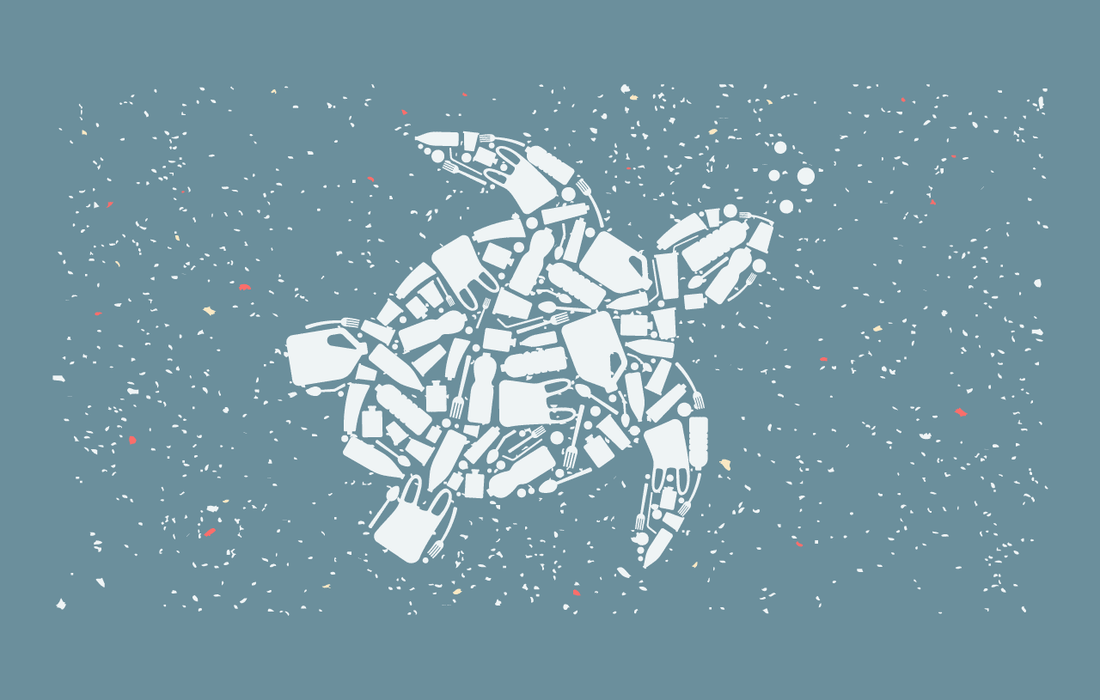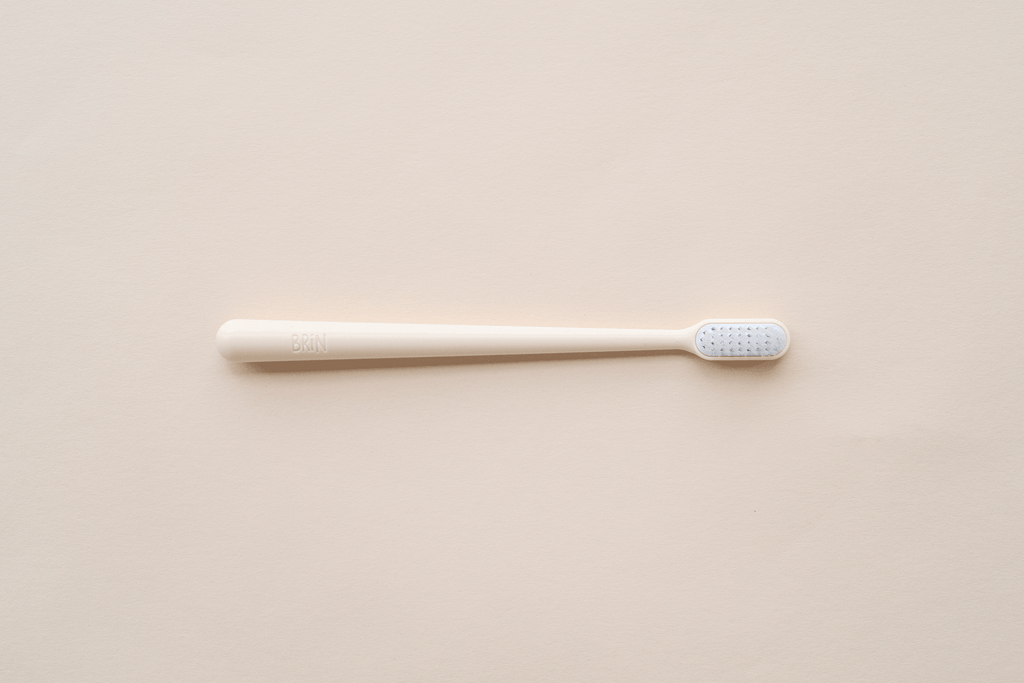
Making Waves with Reusable Toothbrushes: The Impact of Ocean Bound Plastic
Share
Do you want to make a splash in the fight against ocean pollution? Look no further than reusable toothbrushes! In this post, we'll dive into the impact of ocean-bound plastic and how switching to a sustainable alternative can help make waves for our environment. Join us as we explore the benefits of making small changes that have big impacts on our oceans.

The Problem of Ocean Bound Plastic Pollution
The ocean covers over 70% of our planet's surface and is home to countless species of marine life. It also plays a crucial role in regulating our climate and provides essential resources for human activities such as fishing and transportation. However, this vast body of water is facing a severe threat – plastic pollution.
Plastic has become an integral part of our daily lives, and its convenience has led to a global production exceeding 335 million tons per year. Unfortunately, not all plastic waste is recycled or properly disposed of, leading to significant environmental consequences. One of the most alarming issues is ocean bound plastic pollution.
Ocean bound plastic refers to any plastic waste that ends up in the ocean or other water bodies through improper disposal or transport. This waste comes from various sources such as inland littering, poor waste management systems, and illegal dumping at sea. Once in the ocean, it can travel thousands of miles due to ocean currents and wind, leading to its accumulation in specific areas known as "garbage patches."
The impact of this problem on marine life is devastating. Marine animals mistake plastic debris for food and end up consuming it, leading to serious health issues such as starvation and suffocation. The ingestion of microplastics by smaller organisms can also harm larger animals higher up in the food chain through bioaccumulation.
Moreover, ocean bound plastic also affects coastal communities that depend on the ocean for their livelihoods. For instance, fishing nets made out of non-biodegradable plastics snag on coral reefs damaging them beyond repair. This not only affects fish populations but also damages the fragile ecosystems that support them.
Furthermore, apart from harming aquatic life, ocean bound plastic also poses a threat to human health. Microplastics have been found in seafood consumed by humans, exposing us to harmful chemicals present within these materials.
Given these grave repercussions, addressing ocean bound plastic pollution should be a top priority. It requires a collective effort from individuals, governments, and industries to reduce plastic waste production and improve waste management systems.
Making small changes in our daily lives, such as switching to reusable toothbrushes, can make a significant impact in the long run.

The impact of plastic on marine life and ecosystems
Plastic pollution is one of the biggest environmental challenges facing our planet today. With nearly 8 million tons of plastic entering our oceans every year, marine life and ecosystems are suffering tremendously. The impact is especially severe in coastal regions where plastic waste accumulates and threatens the delicate balance of marine habitats.
The detrimental effects of plastic on marine life are numerous and far-reaching. One of the most obvious impacts is entanglement. Marine animals such as seabirds, turtles, seals, and whales often get tangled in discarded fishing nets or other forms of plastic debris. This can lead to injury or even death due to suffocation or drowning. In addition, some animals mistake small plastic fragments for food and ingest them, causing blockages in their digestive systems that can be fatal.
The effects of plastic on marine ecosystems go beyond just individual animals. Plastic debris can also have a profound effect on entire ecosystems by disrupting food chains and altering habitats. For example, coral reefs – home to countless species – are particularly vulnerable to damage from discarded fishing gear and other types of plastics that smother the delicate structures.
Furthermore, microplastics – tiny fragments smaller than 5 mm – pose an immense threat to ocean life. These particles are created when larger pieces of plastic break down over time, but never truly disappear from the environment. They can be mistaken for food by filter-feeding animals such as plankton and enter the base level of the marine food chain where they accumulate in increasingly higher concentrations as they move up through various predators
The consequences of this accumulation extend not only to the animals who consume these microplastics but also to humans who consume seafood contaminated with them. As we continue to produce more disposable plastics with no end-of-life plan in place, we are taking part in a vicious cycle that has disastrous consequences for both marine life and ourselves.
It's clear that addressing plastic pollution is crucial in protecting our oceans and its inhabitants from further harm. One simple but effective solution is to reduce our consumption of single-use plastics and opt for more sustainable alternatives, like reusable toothbrushes. By making small changes in our daily habits and decreasing plastic waste, we can make a big impact on the health of our oceans.
Let's take action today in protecting our planet's most valuable resource.
How reusable toothbrushes can reduce plastic waste
One of the major contributors to ocean pollution and plastic waste is single-use plastics, including toothbrushes. In fact, over 3.6 billion plastic toothbrushes are used and disposed each year in the United States alone. These toothbrushes often end up in landfills or make their way into our oceans, where they harm marine life and disrupt fragile ecosystems.
To combat this problem, many individuals and companies have turned to reusable toothbrushes as an eco-friendly alternative. These brushes are typically made from sustainable materials such as bamboo or biodegradable plastics, which can be used for months on end with proper care.
But how exactly do these reusable toothbrushes help reduce plastic waste? Let's take a closer look at some of the ways:
1) Fewer Plastics Going to Landfills:
By using a reusable toothbrush instead of a disposable one, you eliminate one more piece of plastic that would otherwise end up in a landfill. This helps reduce the amount of space needed for trash disposal and slows down the rate at which landfills fill up.
2) Reduction in Production:
The production process for disposable plastic toothbrushes uses significant amounts of resources like water and fossil fuels. By switching to a durable reusable brush, fewer resources are needed for manufacturing, reducing your carbon footprint.
3) Recycling Capabilities:
Some reusable toothbrushes are made from recycled materials or can be recycled themselves once they've reached the end of their lifespan. This not only reduces plastic waste but also encourages recycling practices among consumers.
4) Smaller Carbon Footprint:
Single-use products require constant reordering and transportation from manufacturers to stores before reaching consumers' homes. This results in greenhouse gas emissions that contribute to climate change. With reusable toothbrushes lasting 2-3 times longer than traditional ones, there is less need for frequent purchases and shipping.
5) Supporting Sustainable Brands,
like BRiN, committed to sustainability and ocean conservation. By purchasing their products, you are supporting companies with a mission to reduce plastic waste and protect the environment.
Small actions like switching to reusable toothbrushes can have a significant positive impact on our planet's health. With the growing awareness of the plastic crisis, more individuals are making the switch and encouraging others to do the same. Together, we can make a difference in protecting our oceans from harmful plastic pollution.
The benefits of using a reusable toothbrush over traditional plastic ones
There is an easy solution to reduce our plastic footprint when it comes to dental hygiene – switching to reusable toothbrushes.
Our toothbrush SeaDifferently is made of OBP (Ocean Bound Plastic) recycled plastic, and have a replaceable head instead of being completely thrown away after use.
Not only does SeaDiffetnly significantly decrease our contribution to ocean-bound plastic, but they also come with a range of other benefits.
Switching to a reusable toothbrush is not only a small but impactful act towards reducing our plastic waste, but it also comes with several other benefits such as saving money, being better for our health, and using sustainable materials.
By making this simple change in our daily routine, we can make a significant positive impact on the environment and be part of the solution to reduce the amount of plastic ending up in our oceans.
What's next
The impact of plastic pollution on our oceans is undeniable and continues to be a growing concern for our planet. It not only affects marine life, but also human health, economies, and the environment as a whole. However, by taking small steps like switching to reusable toothbrushes, we can make a big difference in creating a cleaner future for generations to come.
Now that you are aware of the impact of ocean-bound plastic and the benefits of using reusable toothbrushes, it's time to take action. Here are some ways you can make a positive change towards a cleaner future:
1. Switch to Reusable Toothbrushes:
The first step is simple - switch from single-use plastic toothbrushes to eco-friendly reusable ones. As we have discussed earlier in this article, by making this small change in your daily routine, you will prevent tons of plastic waste from ending up in our oceans each year.
2. Educate Others:
Share what you have learned with your friends and family. By raising awareness about the issue and encouraging others to make sustainable choices like choosing reusable toothbrushes, we can collectively reduce the amount of plastic waste entering our oceans.
3. Reduce Plastic Use:
Apart from making changes in your oral care routine, try reducing the use of other single-use plastics such as straws or water bottles. Instead, opt for sustainable alternatives like metal straws or refillable water bottles.
4. Participate in Beach Cleanups:
Another way to actively contribute towards a cleaner future is by participating in beach cleanups or community events focused on reducing plastic pollution. Not only will you be helping clean up our beaches and oceans, but you will also inspire others to do their part.
Every small action counts when it comes to creating a cleaner future for our planet.
By simply switching to reusable toothbrushes and making more sustainable choices in our daily lives, we can reduce the amount of plastic waste in our oceans and make a positive impact on the environment.
So, let's come together and make waves with reusable toothbrushes for a cleaner future!




